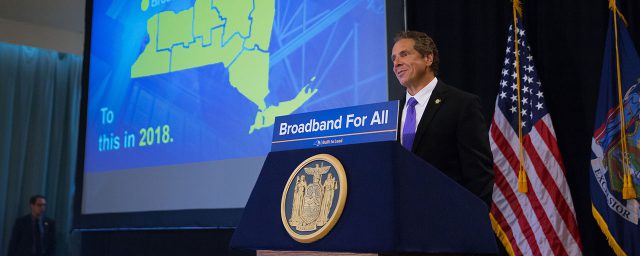
Gov. Andrew Cuomo discusses his rural broadband initiative in New York.
Despite repeated assurances that 98% of New Yorkers now have access to high-speed internet, rural New Yorkers from the state’s border with Massachusetts to farm country outside of Niagara Falls don’t believe it. Now New York’s Comptroller, Thomas P. DiNapoli, is auditing the half-billion dollar program to determine where the money went and where broadband service is now available.
A source told WGRZ-TV in Buffalo that an audit of Gov. Andrew Cuomo’s “Broadband for All” program was initiated by the Comptroller’s office back in March 2020 after rural residents and the lawmakers that represent them began complaining the program never delivered on its commitments. WGRZ Reporter Nate Benson notes that what may have started as a routine audit may now be under additional scrutiny because of the impact of the COVID-19 pandemic, which forced many New Yorkers online for work and learning from home.
The broadband program, introduced with great fanfare by the governor in 2015, promised that every New Yorker that wanted high speed internet (at least 25 Mbps in rural areas, 100 Mbps in urban communities) would have access by the end of 2018. The governor claimed the state earmarked $500 million — mostly proceeds from legal settlements with large New York City banks accused of criminal activity surrounding the Great Recession — towards the program, with dollar for dollar matching from companies awarded grants to expand internet access in specific areas.
Benson noted that publicly available data on the N.Y. Broadband Program Office website found a significant shortfall in private investment dollars, with only four out of 53 internet service providers awarded grants matching or exceeding the amounts they received from the state broadband fund. In short, they accepted generous subsidies without being equally generous with their own money.
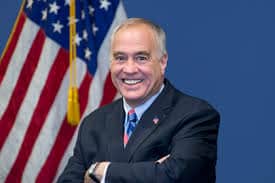
DiNapoli
The program used a reverse auction approach to award state broadband funding. Phone, cable, and wireless providers bid to serve one or more of the 256,000 “census blocks” the state identified as lacking access to high-speed internet. Most companies chose the most densely populated census blocks next to their existing service areas, assuring higher profits while the state paid a significant amount of the construction costs. In the end, 76,000 census blocks in very rural, sparsely populated areas least likely to get broadband service attracted no bids at all. To achieve the state’s vaunted “98% served,” officials signed a contract with a satellite internet provider to service the remaining 30% of rural New Yorkers left behind, despite the fact satellite internet providers had a reputation for not meeting subscriber expectations and rarely guaranteed consistent minimum broadband speeds of 25 Mbps. Hughes Satellite provides the service, but our readers using the service warn it comes with a stingy data cap inadequate for today’s average household usage. Speeds are wildly inconsistent as well, often way below 25 Mbps.
Even with satellite internet as an option, New Yorkers continue to tell Stop the Cap! they are still without access, including satellite, even in communities just a few miles outside of major cities like Albany, the state capital. The true scope of the problem became apparent last spring as the coronavirus pandemic emerged, forcing employers to send workers home and schools switched to online learning.
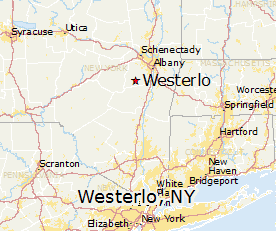
Westerlo, N.Y.
The Berne Knox Westerlo School District, located in the hill towns of Albany County, quickly realized there was a wide gap between the state’s “98% covered” claim and reality.
“We had about 28-30% of our student population without internet access or with very poor internet access.” Superintendent Dr. Timothy Mundell told WRGB News. The district tried stop-gap measures like parking Wi-Fi enabled school buses around the district and handing out Wi-Fi hotspot devices, which proved to work unevenly. Mundell says the only real solution to this problem is ubiquitous fiber to the home internet access, and that is a long way off.
“It concerns me because every day we’re without, my students have the potential of falling behind their peers down in the suburbs and the urban areas,” Mundell said. “So this is a real equity issue for us and we want to make sure rural areas get served.”
Two Republican lawmakers from Western New York also introduced a bill this year to repeal a 2019 state tax on optical fiber cable projects. Senators George Borrello and Pam Helming believe the tax will discourage fiber optic buildouts, especially in higher cost rural areas.
“The reality is that broadband is no longer a luxury this is a basic infrastructure need just like water sewer electric and roads, and without it we’re not going to be able to expand.” Sen. Borrello said.

Dundee, N.Y.
But the biggest proponent of the law’s repeal, Verizon Communications, is also one of the telecommunications companies showing the least interest in expanding its fiber internet service in rural New York. Verizon is fighting the tax so it can save money on expanding its mobile 4G and 5G wireless networks, which are connected with fiber optic cables, not because it wants to expand FiOS fiber to the home service.
Meanwhile, New Yorkers without broadband remain stuck.
“It’s all a lot of empty promises with no sign of service,” Katy tells Stop the Cap! from her home near Dundee, in the Finger Lakes region of the state. “I’ve lived here since the days when the only phone line you could get was a party line shared with four other homes and I still have my rotary dial phone New York Telephone installed in 1965. These companies don’t want me to forget I am living in the past.”
Katy lives about 500 feet from the nearest address able to subscribe to Charter Spectrum and was quoted $9,000 to extend cable to her home, set far back from the main road. Verizon has never offered DSL in her neighborhood, because she is located too far away from the central office. Her property is set in a small forest, so satellite internet is not a possibility either.
“I can watch two channels over the air from Syracuse with my outdoor antenna, but that is all. I guess I prefer reading anyway,” she tells us.
WGRZ in Buffalo reports the New York State’s Comptroller’s Office is auditing Gov. Andrew Cuomo’s Broadband for All program, which guaranteed 98% of New Yorkers high-speed internet. (3:06)


 Subscribe
Subscribe
 In fact, many broadband providers elected to curtail investment even before the COVID-19 pandemic arrived. Charter, Comcast, AT&T, and Verizon have all reduced investment in residential wired broadband services, in part because of a lack of competitive marketplace. Pai, a former lawyer for Verizon, has spent the last four years making life very comfortable for the country’s largest internet service providers. He eliminated mandated competition in set-top boxes, did nothing to stop data caps, eliminated net neutrality protections, and helped enact new rules allowing mobile providers to place future cell towers and other equipment in places that have never been acceptable before.
In fact, many broadband providers elected to curtail investment even before the COVID-19 pandemic arrived. Charter, Comcast, AT&T, and Verizon have all reduced investment in residential wired broadband services, in part because of a lack of competitive marketplace. Pai, a former lawyer for Verizon, has spent the last four years making life very comfortable for the country’s largest internet service providers. He eliminated mandated competition in set-top boxes, did nothing to stop data caps, eliminated net neutrality protections, and helped enact new rules allowing mobile providers to place future cell towers and other equipment in places that have never been acceptable before.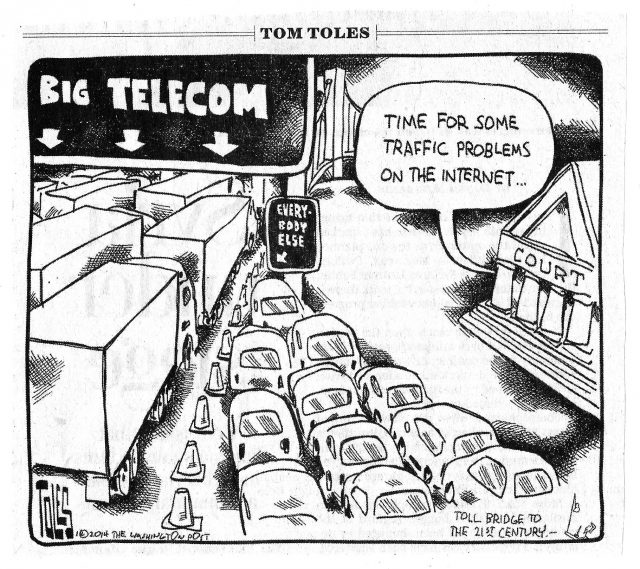 Pai’s tenure as chairman has been four years of smug arrogance and a complete disinterest in the input of consumers. Millions have told the FCC to leave net neutrality policies in place. Pai and his Republican colleagues ignored them. The Republican commissioners have delivered speeches at some of the most partisan right-wing groups imaginable, but won’t respond to ordinary Americans looking for actual evidence of competition and consumer protection. For much of this year, Pai’s two Republican colleagues have spent much of their time on Twitter pursuing their own agendas. Commissioner O’Rielly has made closing down low power community pirate radio stations his obsession. At least that is covered under the FCC’s mandate. Commissioner Carr has spent his time on Twitter complaining about people being mean to President Trump on social media, his obsession with China and freedom of speech, and his suspicions about the World Health Organization (WHO).
Pai’s tenure as chairman has been four years of smug arrogance and a complete disinterest in the input of consumers. Millions have told the FCC to leave net neutrality policies in place. Pai and his Republican colleagues ignored them. The Republican commissioners have delivered speeches at some of the most partisan right-wing groups imaginable, but won’t respond to ordinary Americans looking for actual evidence of competition and consumer protection. For much of this year, Pai’s two Republican colleagues have spent much of their time on Twitter pursuing their own agendas. Commissioner O’Rielly has made closing down low power community pirate radio stations his obsession. At least that is covered under the FCC’s mandate. Commissioner Carr has spent his time on Twitter complaining about people being mean to President Trump on social media, his obsession with China and freedom of speech, and his suspicions about the World Health Organization (WHO).
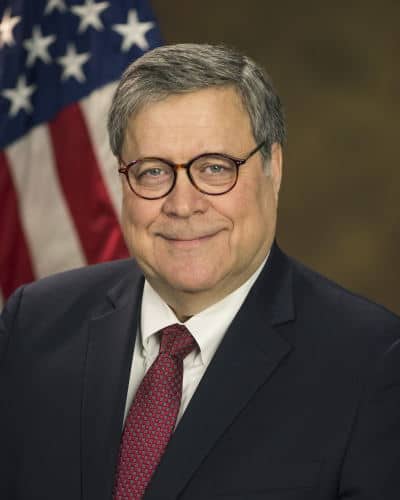
 The Justice Department proposal primarily states that when internet companies “willfully distribute illegal material or moderate content in bad faith, Section 230 should not shield them from the consequences of their actions.”
The Justice Department proposal primarily states that when internet companies “willfully distribute illegal material or moderate content in bad faith, Section 230 should not shield them from the consequences of their actions.” In June, the Justice Department proposed that Congress take up legislation to curb this immunity. This was after Trump in May signed an executive order that seeks new regulatory oversight of tech firms’ content moderation decisions and backed legislation to scrap or weaken Section 230.
In June, the Justice Department proposed that Congress take up legislation to curb this immunity. This was after Trump in May signed an executive order that seeks new regulatory oversight of tech firms’ content moderation decisions and backed legislation to scrap or weaken Section 230.
